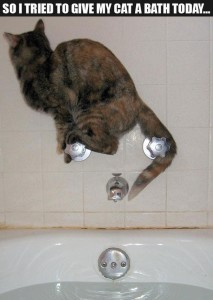A post from student blogger Josh
Well actually, we tend to go into our first round interviews expecting the worst. For your first time, it actually would be excusable to expect the Spanish Inquisition (I’m sure that the university is less than proud of that particular piece of Catholic heritage). But having just lost my brief phone interview virginity to a lovely firm who promised to call again, I can tell you that the process is not as excruciating as you might imagine.
The main purpose of a half – hour phone interview is to determine whether or not you are an individual selected from the group consisting of axe murderers, criminal masterminds, bumbling idiots, republican congressmen, and garden variety unemployable psychopaths. Side note to you future patent nerds, the prior sentence is the appropriate language for a special type of claim called a Markush claim, wherein you are trying to state that a component of an invention can be formulated from anything within a defined category of “stuff”. The proper format recites alternatives for a component of a claim by saying that the component is “selected from the group consisting of A, B, and C” (this is from section 803.02 of the Manual of Patent Examining Procedure, and if you quote it to Karen she will give you a gold star and some brownie points, or at least glare at you with slightly less than her ordinary level of scary yet loving disapproval).
Back to the topic of interviews, the process is one containing multiple steps. You send in a resume that basically says “look at how qualified I am to do exactly what you want to hire somebody for”, and this document gets you in the door. While I would advise against committing any form of fraud here, it is expected that your resume will highlight your skills in such a way that you appear fit for the specific position you want. Tell the truth; just make sure it’s the right truth. Since people belonging to the above category of undesirables are occasionally capable of concocting decent resumes (I’d definitely at least talk to a guy who claimed to have hollowed out a volcano to create a laboratory for quasi ethical science experiments), you will then have to speak to someone. I always find it slightly irritating when people spend time completing activities to pad a resume, and yet are unable to string a proper sentence together (looking your way, 50% of every high school honors society and anyone who paid to be part of a non –field specific collegiate Greek organization that hangs cords around your freshly graduated neck). My academic career has certainly been checkered, and many of you reading this are probably higher achievers on paper than myself. In no way does this guarantee you a job. The processes of interviewing and networking, like practicing law, require the ability to effectively communicate with people.
Once you’ve convinced the individuals in human resources that you can write like Hemmingway and interview like a late night host, this is where you get into the more serious discussions and negotiations with partners. Meanwhile, the H.R. folks return to the wanton stack of sexual harassment complaints against that congressman they mistakenly hired last year (sometimes one slips through the cracks, though that’s what you get for hiring someone named Weiner). By now you should already have asked a number of questions of the firm, and have a decent idea of what you’re walking into. You should know what would be expected of someone in your position in terms of time commitment, what the structure of the firm is like, who their big clients are and what type of work they actually want you to do. I have no advice for this phase yet, because as I mentioned earlier, I’m just beginning this process myself. The good news is that the lovely people at the law school career center can help you along every step of the way, from resume reviews to mock interviews, and coach you on what topics to highlight vs. those to avoid. We’re so used to focusing on school that we often forget the entire point of our education is to enter the workplace in a desirable position. While there are many great things about higher education which I wholeheartedly support, let’s not kid ourselves and pretend that it’s magically made us into well – rounded and fully functioning human beings. I would bet that most of you reading this could tell me Newton’s Laws of Motion, but have never changed your own oil (and if you cannot do either of those things, no excuses, you have Google). By making use of the many tools available to students at Notre Dame, you too can eventually make actual money and feel like an adult. If you anticipate this process, as opposed to the Spanish Inquisition, and work to succeed at it (like you have everything else thus far), I can assure you that your odds of being homeless will dramatically decrease.

